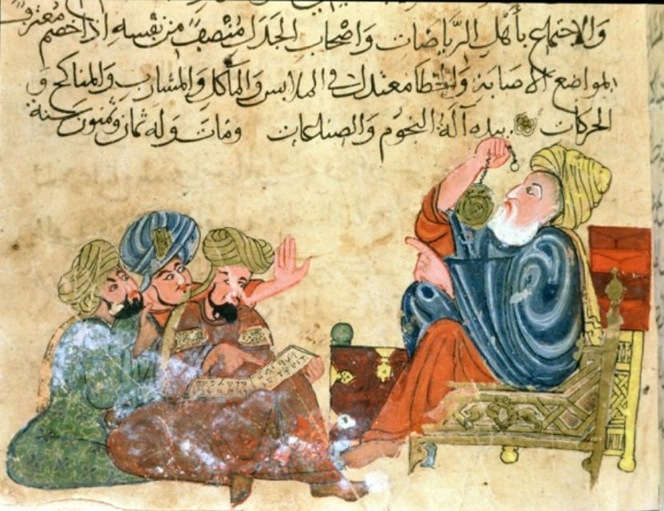
We post copious resources for the study of philosophy on this site, such that you can obtain a full college-level survey understanding of the subject on your own by taking the many free classes, listening to the many free lectures and podcasts, and reading the many free texts, ebooks and commentaries you’ll find here. But several of our posts have met with a similar reader objection: where is the Eastern philosophy?
The question could also be put to almost any academic department of philosophy. One answer I’ve often heard dismisses it altogether. Philosophy, some say, developed in the West, first in ancient Greece, then in Rome, the succeeding Christian empire, and the secular age that followed. It is a European pursuit and tradition. Other culturally partial critics, who wish to appear enlightened, are willing to concede that “the world’s Muslims,” as Richard Dawkins tweeted a few years back, “did great things in the Middle Ages,” at least providing a critical bridge between the fall of the Roman Empire and the rise of Scholasticism.
Islamic philosophers like Avicenna and Averroes kept in dialogue with the Greeks after Europe had forgotten them, and preserved the only work of Aristotle we have. But that was then. What have they done for us lately? Attitudes like this, argues philosophy professor Peter Adamson, are prejudices with little basis in fact, and part of the reason for a dearth of high-quality, accessible Eastern philosophy resources in English. Adamson, who has made significant contributions to the study of philosophy online with his podcast, History of Philosophy Without Any Gaps, fills in the gap with his series on Islamic and Indian philosophy in several parts.
Formative Period—25 episodes
Philosophy in Andalusia—25 episodes
Eastern Traditions—25 episodes
Beginning with philosophy in the Islamic world in Episode 171, “Eastern Traditions,” at the top, Adamson covers “influential thinkers of the twelfth century like Fakhr al-Dīn al-Rāzī and Suhrawardī, focusing on their legacy in the Eastern realms of central Asia and Persia, moving on to the Ottoman, Safavid and Mughal empires, and ending with developments in twentieth century philosophy.” Against dismissive claims like Dawkins’ that these centuries were “a time of intellectual and scientific decline in Islamic civilization,” Adamson argues they were “in fact a time of remarkable achievement in fields like logic and astronomy as well as the various disciplines of philosophy.” See all three parts of the Islamic Philosophy series above.
Adamson shares the introduction to Indian philosophy, just above, with NYU’s Jonardon Ganeri, and the two lay out a case for the tradition as “primarily a way of life and search for the highest good.” As usual, Adamson brings on guest scholars and provides a list for further reading on the podcast’s site. And as usual, his historical frameworks are rigorous and very well-researched. This series breaks into two main categories (below). The second part of the series focuses on the development of a formal tradition, the “sūtra (literally ‘thread’)… a genre of writing in which ideas were set forth in brief, aphoristic form. Various sūtras were taken as authoritative and foundational for numerous schools of Indian thought, which devoted further commentaries to the sūtras.”
Origins—17 episodes
Age of Sutra—15 episodes
As he has done with many of his other series, Adamson has adapted the Islamic Philosophy podcasts in book form, Philosophy in the Islamic World: A history of philosophy without any gaps, Volume 3. His even-handedness and erudition make this series a joy to listen to, though he’d also encourage us to read the philosophers he discusses, if possible. If you’re new to reading philosophy, or to Adamson’s podcast, you’d do well to read his recently posted All 20 ‘Rules for History of Philosophy,’ which he has brought together in one place as “guidelines encapsulating what I see as good practice in studying the history of philosophy.” (Rule 8: “Read the whole text.”)
Many of these guidelines rub up against the current orthodoxies, assumptions and, frankly, snobberies of some contemporary academic philosophy. Among these, “Rule 14: Take religion seriously” and “Rule 15: Be broadminded about what counts as ‘philosophy.’” And for those who not only dismiss but also embrace entire cultures’ philosophical traditions for one defining reason—Indian thought is “spiritual” or “non-violent”; Islamic thought is “tolerant” or “intolerant”—Adamson offers Rule 18: “don’t essentialize.” As becomes clear on even a cursory listen to the podcasts in these series, what we tend to believe about “non-western” philosophy operates far in excess of what most of us actually know about it.
Related Content:
The History of Philosophy … Without Any Gaps
Learn The History of Philosophy in 247 Podcasts (With More to Come)
The History of Philosophy, from 600 B.C.E. to 1935, Visualized in Two Massive, 44-Foot High Diagrams
A History of Philosophy in 81 Video Lectures: From Ancient Greece to Modern Times
The History of Philosophy Visualized
Josh Jones is a writer and musician based in Durham, NC. Follow him at @jdmagness
